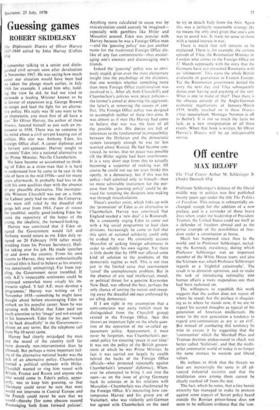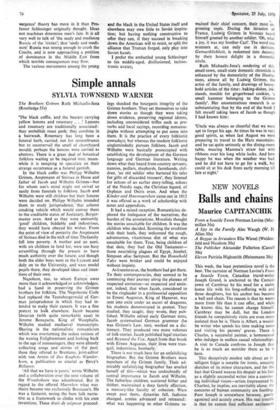Off centre
MAX BELOFF
The Vital Center Arthur M. Schlesinger Jr (Andre Deutsch 45s) Professor Schlesinger's defence of the liberal middle way in politics was first published twenty years ago under the title The Politics of Freedom. This reissue is substantially un- changed, except for the addition of a new preface, and is a reminder of those brave days when, under the leadership of President Truman, the United States could see itself as a defender of freedom abroad and as the prime example of the possibilities of free- dom under a constitution at home.
Much has happened since then to the world, and to Professor Schlesinger, includ- ing the Kennedy presidency, during which Professor Schlesinger was an important member of the White House team; and also the Vietnam war, which Professor Schlesinger regards as a 'frightful catastrophe'. The result is to diminish optimism, and to make the task of introducing rationality into human affairs a more stupendous one than had becn reckoned on.
The willingness to republish this work suggests that the author does not repent of where he stood; but the preface is disquiet- ing as to where he stands now, if we are to regard his second thoughts as typical of his generation of American intellectuals. He notes `in the new generation a tendency to regard anti-communism as per se an evil'. But instead of combating this tendency he tries to excuse it by suggesting that the 'communism' which the Marshall Plan and Truman doctrine endeavoured to check was better called 'Stalinism', and that the multi- polar communist world of today is no longer the same menace to western and liberal values.
He inclines to think that the threats we face are increasingly the same in all ad- vanced industrial societies and that the totalitarian ones among them cannot be clearly marked off from the rest.
The fact, which he notes. that a tiny heroic minority has managed to make its protests against some aspects of Soviet policy heard outside the Russian prison-house does not seem to be sufficient evidence that the 'con- vergence' theory has more in it than Pro- fessor Schlesinger originally thought. Ideas not machines determine men's fate. It is all very well to talk of `the seedy and mediocre Russia of the 'sixties'; that 'seedy and medi- ocre' Russia was strong enough to crush the Czechs, and is now approaching a position of dominance in the Middle East from which terrible consequences may flow.
The various movements among the young
and the black in the United States itself and elsewhere may owe little to Soviet inspira- tion; but having nothing constructive to offer they can, if they succeed in breaking down the American will to resist, or split the alliance that Truman forged, only play into Soviet hands.
I prefer the embattled young Schlesinger to his middle-aged, disillusioned, techno. tronic avatar,































 Previous page
Previous page